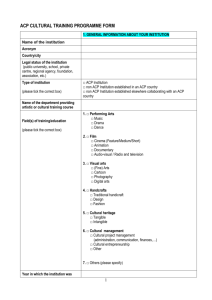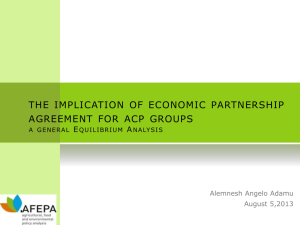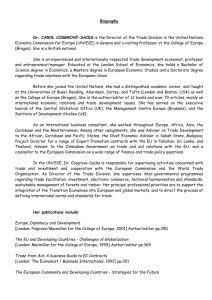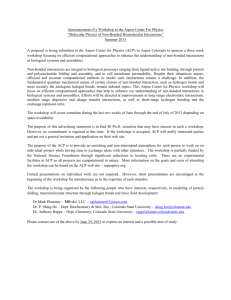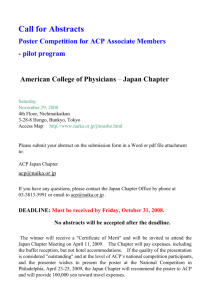eastern africa farmers federation (eaff)
advertisement
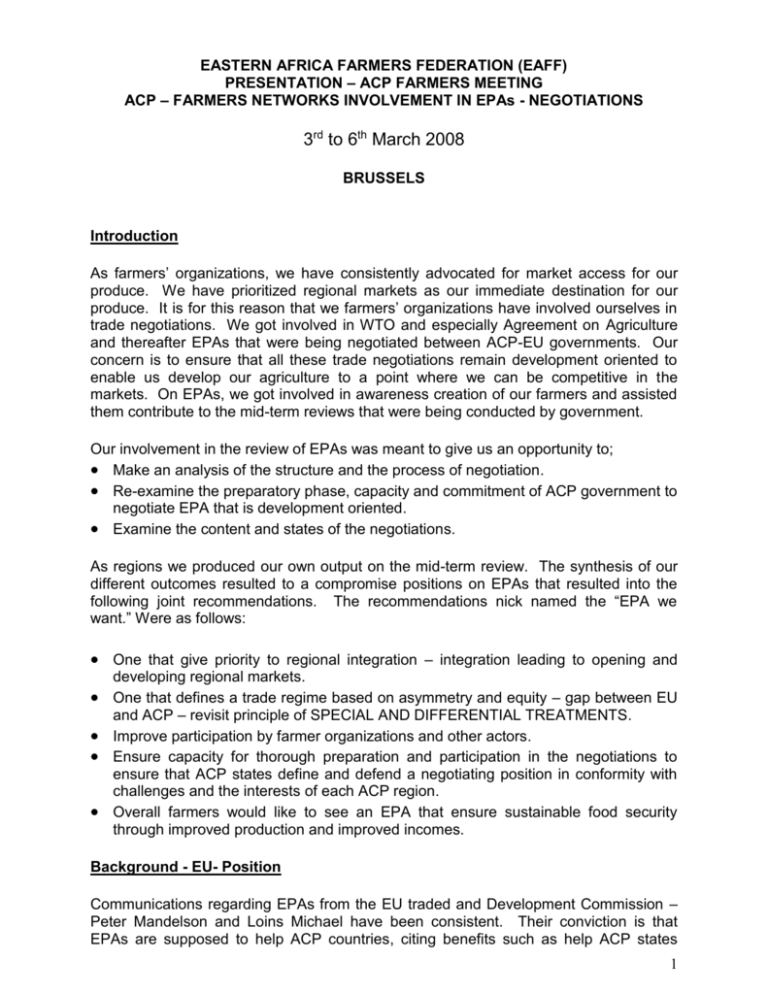
EASTERN AFRICA FARMERS FEDERATION (EAFF) PRESENTATION – ACP FARMERS MEETING ACP – FARMERS NETWORKS INVOLVEMENT IN EPAs - NEGOTIATIONS 3rd to 6th March 2008 BRUSSELS Introduction As farmers’ organizations, we have consistently advocated for market access for our produce. We have prioritized regional markets as our immediate destination for our produce. It is for this reason that we farmers’ organizations have involved ourselves in trade negotiations. We got involved in WTO and especially Agreement on Agriculture and thereafter EPAs that were being negotiated between ACP-EU governments. Our concern is to ensure that all these trade negotiations remain development oriented to enable us develop our agriculture to a point where we can be competitive in the markets. On EPAs, we got involved in awareness creation of our farmers and assisted them contribute to the mid-term reviews that were being conducted by government. Our involvement in the review of EPAs was meant to give us an opportunity to; Make an analysis of the structure and the process of negotiation. Re-examine the preparatory phase, capacity and commitment of ACP government to negotiate EPA that is development oriented. Examine the content and states of the negotiations. As regions we produced our own output on the mid-term review. The synthesis of our different outcomes resulted to a compromise positions on EPAs that resulted into the following joint recommendations. The recommendations nick named the “EPA we want.” Were as follows: One that give priority to regional integration – integration leading to opening and developing regional markets. One that defines a trade regime based on asymmetry and equity – gap between EU and ACP – revisit principle of SPECIAL AND DIFFERENTIAL TREATMENTS. Improve participation by farmer organizations and other actors. Ensure capacity for thorough preparation and participation in the negotiations to ensure that ACP states define and defend a negotiating position in conformity with challenges and the interests of each ACP region. Overall farmers would like to see an EPA that ensure sustainable food security through improved production and improved incomes. Background - EU- Position Communications regarding EPAs from the EU traded and Development Commission – Peter Mandelson and Loins Michael have been consistent. Their conviction is that EPAs are supposed to help ACP countries, citing benefits such as help ACP states 1 build stronger economies and end their dependency on trade preferences and based on basic commodities. This in their view would give greater confidence and more opportunities to local businesses and attract new investments and as a result build stronger regional markets. The current trade regime being negotiated (EPA) is in their view expected to come up with a trading regime that will transform trading relationship in ACP from one based on dependency into one based on economic diversification and growing economies. This in our view as farmers was a very simplistic interpretation and approach. EU also wanted us to believe that EPAs are not meant to address EU problems with ACP- states, but view their current trading regime as inappropriate since it discriminates against some developing countries, some non-ACP countries and many others. In their view this trading arrangement was not compatible with globalization and other anticipated trade arrangement such as WTO. According to EU, they promised ACP and Non ACP countries a reformed trading arrangement in Europe that would facilitate global trade. The positions of the FO networks – Before December 31st 2007 The governance of the negotiations: Limited involvement by stakeholders; They should have involved parliaments, the civil society actors including the press. In general, the negotiations have largely been shrouded in secrecy with very little, if at all any official information about the progress and the issues thereof, available in the public domain. The departure from the original negotiation framework in some regions is undemocratic, illegal and an abuse of the spirit of Cotonou. Intimidation, undue influence, manipulation by the EU to compel some countries to sign also go against the spirit of partnership. The impact of negations on regional integration. The network considers that efforts by the European Commission to have free trade agreements signed with certain countries taken individually, if their respective regional economic blocks were to refuse violates the provisions of the Cotonou Agreement, and would even contribute in time to dismantle the integration process and development issues in the ACP regions. For the FOs networks, the EU would be responsible for the worsening of the poverty situation, of the food insecurity and of the clandestine immigration, if it were to insist on the signing of the Economic Partnership Agreements which gives precedence to European trade. In their view the EU is subreptitiously imposing its will on the ACP States. They do not understand what can be the strategic interest of the EU in closing the negotiations at 31 December 2007 at any cost, by proposing EPA formats which do not correspond to the preoccupations of the regions and even counteract efforts of regional integration. The networks recommend to their negotiators to abandon the logic of the current negotiations and consider the questions from the viewpoint of the ACP population. Likewise, as they were not satisfied with the present negotiations, the networks repeat and re-word the proposals they made in the context of the mid-term review. 2 1. Whatever the urgency and the requirements related to the WTO, which is convalescing anyway, give priority to regional integration and to the instruments necessary to build it, the customs’ union and the protection mechanisms favourable to the development of intra and inter-community agricultural markets. The argument according to which it is impossible for the EU to ask the WTO to accord an extension of the waiver beyond the 31 st of December 2007 seems incomprehensible. So they keep asking for a clarification of the GATT article 24 about <special and differential treatment.> They agree with the analyses that propose that the ACP countries take the initiative to ask the WTO for a waiver, justified by the inability to offer reciprocity to the EU. In this regard, the networks think that a request by the ACP countries to the WTO is justified. 2. The gaps in productivity and competitiveness between ACP and EU economies argue in favour of an EU-ACP trade regime based on asymmetry and equity, and measures aimed at developing the farm production sector and building the capacity of its private economic actors, who are first of all the agricultural producers. 3. The networks deem it necessary to continue political dialogues in order to foster convergence frameworks between the ACP countries involved, while supporting the producers’ organizations in the development of trade circuits within and between the countries of the same region, and even between regions. The promotion of value chains or the vertical integration of supply chains requires a public-private partnership that the networks offer to support form the private sector side. 4. The networks had expressed the wish that the ACP States should take more time and endow themselves with more resources in order to be better prepared. According to their evaluation, what is at stake today is the political courage of the ACP and EU States to support them in the realization of their wishes, without demagogy or manipulation, in their strategies to promote and structure intra and inter-regional agricultural markets that ensure food sovereignty, regional integration and customs’ unions. The proposals put forward by the networks of farmer organizations Towards the EU Call upon the European commission to respect the initial framework of negotiations and takes it s principles on board A wider discussion on European support mechanisms for the agricultural sector in ACP countries involving the FO networks Towards the ACP Although the networks would like to see a reorientation of the EPAs responding to their preoccupations, they note that the challenges which face the development of the ACP will not disappear from one day to the next. Whether or not the EPAs are signed on the agreed date, Whether or not the DOHA Round is completed, they intend to organize themselves and to interact with their governments and other stakeholders, to tackle the existing challenges and new ones. They will address the priorities for which they feel they are able to take 3 responsibility or in which they wish to be involved: food security, agricultural development, environmental and climate change, the energy crisis, etc. they request the support of the national governments of African regional integration organizations and of their partners in order to strengthen the FOs’ capacities so that they can constitute a force of proposal and pressure in every country advocating the development needs of agricultural sector. The FO networks urge the ACP to; - take the initiative to request the WTO to grant a waiver for the LDCs; - formulate their own position paper for the negotiations - set up permanent mechanisms of dialogue between the ACP Secretariat, the African union, the regional integration institutions and the producers organization The commitments of the networks The networks commit themselves to: work towards meeting the challenge of improving the offer of agricultural and agro-food products, in quality, in order to meet the demand of the ACP populations and industries; strongly defend the interests of the family farms in all the policy negotiations; promote trade exchanges within and among the ACP regions; They engage the presidents of the networks to work towards the establishment of a dialogue forum of the FO networks of the ACP countries and of Africa by the end of 2007. in this perspective the networks plan to hold a further meeting to discus in greater depth the structure and the lines of action of an <ACP agricultural platform > and to prepare for the next steps in the negotiations between Europe and the ACPs (Lisbon and Kigali so far as Africa is concerned); Monitor the negotiations and the circuits of exchange of information among the networks in order to be more reactive and attentive to the development challenges of the countries; Continue to conduct advocacy and lobbying directed towards the governments and the partners in favour of regional integration, customs union and of the intra and inter regional agricultural markets on which they must be based and geostrategic interests over ACP integration, the strengthening of their production units and their regional markets, the regional policies based on the principles of food sovereignty. Quality over time is what is needed. The negotiation should not be guided by timeframe but at meeting the needs and aspiration of the people of the different regions taking into account their unique and different levels of developed and at the same time it should facilitate rather than dismantle the integration movement. The development dimension. The FO’s maintains the importance of inserting development provisions throughout the economic partnership agreement and the need to provide the regions with the funding mechanisms necessary to address its transformative needs. Fall back. There is need for the states to put in place the necessary precautions to cushion the negative fall out of failed agreement or the consequences of not signing, this should be negotiated with the stakeholders at national level. 4 As the negotiations approached the end (Dec. 31st 2007) there was a shift of strategy from the EU side. EU acknowledged that some countries would not be able to conclude the negotiations by their deadline. Instead of no deal at the end of the year, EU asked ACP countries to focus on reaching agreement on trade in goods –A light EPA. This shift confirmed our fears all along as farmers in ACP countries that EU was not interested in development issues on EPAs. Their interest is an agreement that will allow EU invade ACP markets. This will definitely not meet ACP expectations. The commissioner even used existing development support to the ACP i.e. $23.3 billion in development – EDFs, $28 billion in AID FOR TRADE TO encourage signing of A light EPA. Towards the end of the signing deadline December 2007, the regional farmers organizations positioned themselves different as governments intensily consulted to decide on the position to take as the deadline was approaching. The last minute position taken by farmers organizations were all based on regional specifity as regards the character of agriculture and demands on negotiated positions from producers that would be inclusive i.e. West Africa – West African Farmers say stop the signing of EPA. As for ROPPA which is the network of farmers organizations in Western Africa, Food sovereignty and regional integration are their main expectations and according to them the EPA negotiations in their current form will only entrench poverty and are therefore a threat to survival of farmers in the region. Central Africa – They do not see how a family farmer will benefit from EPAs. PROPAC which is the central African network of farmers organizations advocates for the negotiations period to be extended to allow negotiation of an EPA that is development oriented. Eastern Africa – They considered full and well negotiated EPAs. As good for economic development and regional integration. As regards EAFF which is a regional farmers network they are concerned about opening of markets, but for the sake of producers some of whom are small scale farmers and in absence of any safeguards from government as an alternative they would support the regional government to sign, but sign as a regional Economic Community (RECs) in this case EAC to ensure sustainability of the regional integration process. Southern Africa – The Southern Africa farmers would like negotiations to continue until a favourable agreement is obtained. SACAU the regional farmer network accept that there are key issues to be dealt with before trade. The solutions is not however in fighting EPA negotiations, but in using the remaining time of negotiations to ensure that issues of interest to farmers are taken into account in the final agreements 5 The Eastern Africa Farmers Federation has continued raising issues of concern to smallholders in the region. EPAs will have profound impact on the agricultural sector. We have continued to inform our members about the negotiations through awareness creation. We were aware that our farmers had not been adequately involved by our states in the negotiation. The ESA as a negotiation region have already disintegrating. countries already agreed to sign a light EPA. The five (5) EAC The European Commission has already initialed an interim Partnership Agreement with Kenya, Uganda, Tanzania, Rwanda and Burundi. They are expected to continue negotiating a full EPA. The export goods from EAC will maintain the status quo conditions. Under the reciprocity clause, the signatory countries will liberalise 82% trade by value: 64% in two years, 80% in 15 years and the remainder in 25 years. This will cover 74% of their tariff lines. Agricultural products will however be excluded from liberalization. The farmers of Eastern Africa condemn the light EPA because we believe that is only a FULL EPA properly negotiated that can deliver full development. Our worry is that signing any form of EPA will see out states loss leverage to negotiate and may witness EU frustrate our efforts to negotiate a meaningful development component thereafter. It is now crystal clear to all of us that with EU pushing the trade component, confirms that EU is just interested in the markets. EU will thereafter use the current EDF resources not for our development but to facilitate EU access to our markets. We are informed that EU is already pushing for a transitional parcel of compliance much shorter than 25years. Our position as farmers of the region is that we want our states to negotiate an EPA that will facilitate development, fast track our regional integration to facilitate trade, ensure development of our agriculture and protect our markets. These are the principles and values we shall be repeatedly informing our governments and negotiators as we proceed with negotiations that will lead to signing of a full EPA. Thanks. P.M. KIRIRO PRESIDENT EAFF 6

